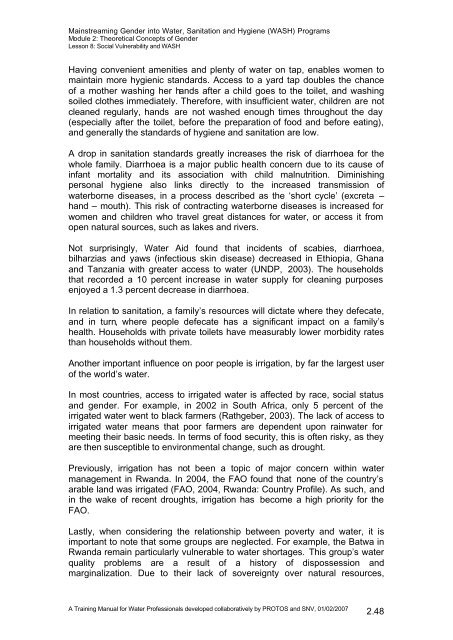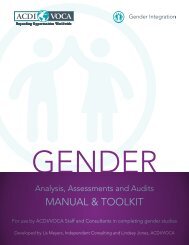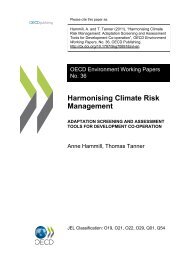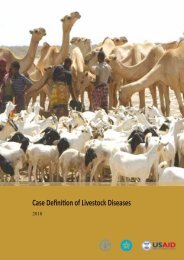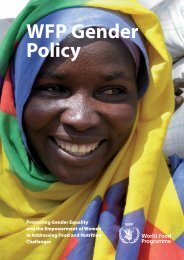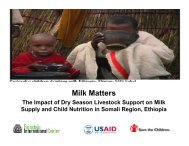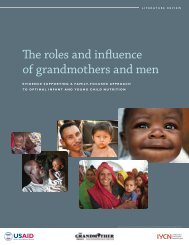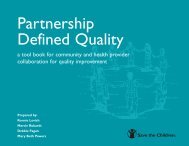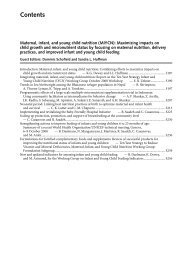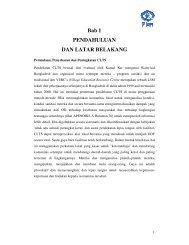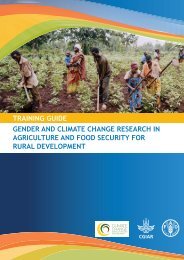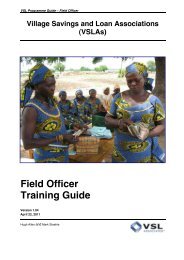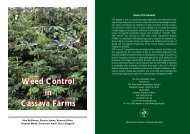Module 2. Theorethical Concepts of Gender - FSN Network Portal
Module 2. Theorethical Concepts of Gender - FSN Network Portal
Module 2. Theorethical Concepts of Gender - FSN Network Portal
You also want an ePaper? Increase the reach of your titles
YUMPU automatically turns print PDFs into web optimized ePapers that Google loves.
Mainstreaming <strong>Gender</strong> into Water, Sanitation and Hygiene (WASH) Programs<br />
<strong>Module</strong> 2: Theoretical <strong>Concepts</strong> <strong>of</strong> <strong>Gender</strong><br />
Lesson 8: Social Vulnerability and WASH<br />
Having convenient amenities and plenty <strong>of</strong> water on tap, enables women to<br />
maintain more hygienic standards. Access to a yard tap doubles the chance<br />
<strong>of</strong> a mother washing her hands after a child goes to the toilet, and washing<br />
soiled clothes immediately. Therefore, with insufficient water, children are not<br />
cleaned regularly, hands are not washed enough times throughout the day<br />
(especially after the toilet, before the preparation <strong>of</strong> food and before eating),<br />
and generally the standards <strong>of</strong> hygiene and sanitation are low.<br />
A drop in sanitation standards greatly increases the risk <strong>of</strong> diarrhoea for the<br />
whole family. Diarrhoea is a major public health concern due to its cause <strong>of</strong><br />
infant mortality and its association with child malnutrition. Diminishing<br />
personal hygiene also links directly to the increased transmission <strong>of</strong><br />
waterborne diseases, in a process described as the ‘short cycle’ (excreta –<br />
hand – mouth). This risk <strong>of</strong> contracting waterborne diseases is increased for<br />
women and children who travel great distances for water, or access it from<br />
open natural sources, such as lakes and rivers.<br />
Not surprisingly, Water Aid found that incidents <strong>of</strong> scabies, diarrhoea,<br />
bilharzias and yaws (infectious skin disease) decreased in Ethiopia, Ghana<br />
and Tanzania with greater access to water (UNDP, 2003). The households<br />
that recorded a 10 percent increase in water supply for cleaning purposes<br />
enjoyed a 1.3 percent decrease in diarrhoea.<br />
In relation to sanitation, a family’s resources will dictate where they defecate,<br />
and in turn, where people defecate has a significant impact on a family’s<br />
health. Households with private toilets have measurably lower morbidity rates<br />
than households without them.<br />
Another important influence on poor people is irrigation, by far the largest user<br />
<strong>of</strong> the world’s water.<br />
In most countries, access to irrigated water is affected by race, social status<br />
and gender. For example, in 2002 in South Africa, only 5 percent <strong>of</strong> the<br />
irrigated water went to black farmers (Rathgeber, 2003). The lack <strong>of</strong> access to<br />
irrigated water means that poor farmers are dependent upon rainwater for<br />
meeting their basic needs. In terms <strong>of</strong> food security, this is <strong>of</strong>ten risky, as they<br />
are then susceptible to environmental change, such as drought.<br />
Previously, irrigation has not been a topic <strong>of</strong> major concern within water<br />
management in Rwanda. In 2004, the FAO found that none <strong>of</strong> the country’s<br />
arable land was irrigated (FAO, 2004, Rwanda: Country Pr<strong>of</strong>ile). As such, and<br />
in the wake <strong>of</strong> recent droughts, irrigation has become a high priority for the<br />
FAO.<br />
Lastly, when considering the relationship between poverty and water, it is<br />
important to note that some groups are neglected. For example, the Batwa in<br />
Rwanda remain particularly vulnerable to water shortages. This group’s water<br />
quality problems are a result <strong>of</strong> a history <strong>of</strong> dispossession and<br />
marginalization. Due to their lack <strong>of</strong> sovereignty over natural resources,<br />
A Training Manual for Water Pr<strong>of</strong>essionals developed collaboratively by PROTOS and SNV, 01/02/2007<br />
<strong>2.</strong>48


